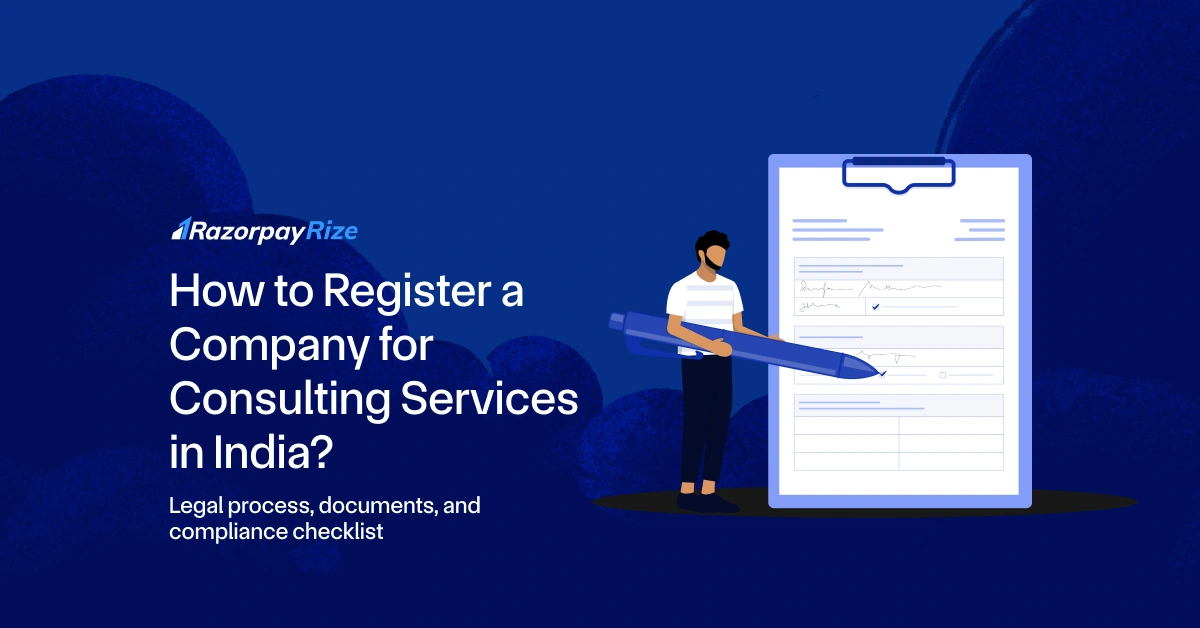India’s construction industry is one of the fastest-growing sectors, contributing significantly to economic development and job creation. With increasing urbanisation, government-led infrastructure projects, and rising demand for residential and commercial spaces, the sector presents a massive opportunity for entrepreneurs.
Starting a construction company today offers the potential for long-term profitability and the opportunity to contribute to the nation’s development journey.
But launching a successful construction company requires more than just technical know-how. It involves strategic planning, legal compliance, financial preparation, and effective operational execution.
This guide walks you through everything you need to know to start your own construction business in India.
Table of Contents
What is a Construction Business?
A construction business is involved in the planning, designing, constructing, and maintaining buildings and infrastructure. This includes residential properties, commercial complexes, roads, bridges, and industrial structures. Construction businesses manage everything from groundwork to the final delivery of projects.
There are several types of construction businesses, such as:
- General Contracting Firms: Manage entire construction projects.
- Specialised Trades: Focus on specific services like electrical work, plumbing, HVAC, or roofing.
- Project Management Companies: Oversee project timelines, budgets, and subcontractors for clients.
Each type serves a distinct market and can be scaled based on expertise and demand.
Why Should You Start a Construction Company?
Starting a construction company can be both profitable and impactful. Here’s why:
- High demand: Real estate growth, government infrastructure spending, and smart city developments keep demand steady.
- Lucrative contracts: Projects often run into lakhs or crores, offering good revenue potential.
- Entrepreneurial freedom: Be your own boss, choose your projects, and build your brand.
- Job creation & impact: You directly contribute to community development by building homes, schools, hospitals, etc.
- Long-term stability: A construction company can grow into a multi-city or even national operation with the right strategy.
Different Business Structures of a Construction Company
Choosing the right business structure is crucial, as it determines how your business is owned, taxed, and operated. Here are some common options in India:
- Private Limited Company: Offers limited liability, legal recognition, and easier funding options; Ideal for medium to large construction firms.
- Public Limited Company: Suitable for large construction firms planning to raise public funds; Requires more compliance and regulatory oversight.
- Limited Liability Partnership (LLP): Offers flexibility with limited liability protection; Good for small to mid-sized firms with multiple partners.
- One Person Company (OPC): Great for solo entrepreneurs who want to limit liability while maintaining full control.
- Partnership Firm: Simple to set up; best suited for small businesses with limited investment and informal structures.
- Subsidiary Company: A foreign company can establish a construction subsidiary in India, offering tax and operational benefits.
In New Delhi, the stamp duty on an LLP Agreement is charged at 1% of the total capital contribution.
{{company-reg-cta}}
Benefits of Starting a Construction Company in India
The Indian market presents numerous advantages for construction entrepreneurs:
- Massive Market Demand: The need for housing, commercial spaces, roads, and public infrastructure is growing rapidly.
- Government Push: Schemes like AMRUT, Smart Cities Mission, and PMAY are fueling construction activity.
- Urbanisation: Rapid growth in Tier 1 and 2 cities increases residential and commercial needs.
- Real Estate Boom: Increased investment in the real estate sector drives demand for contractors and developers.
- High Revenue Potential: Construction projects often have high profit margins if well-managed.
Requirements to Start a Construction Company
Here are the basic requirements to legally and effectively start your construction business:
- Choose a Legal Structure (e.g., Pvt Ltd, LLP, Partnership)
- Company Registration with the Ministry of Corporate Affairs (MCA)
- PAN, TAN & GST Registration
- Professional Tax and Labour Law Compliance
- Business Bank Account for financial operations
- Construction Licenses/Permits, such as contractor licenses, environmental clearances (if applicable)
- ESIC and EPF Registration if you employ workers
- Insurance Policies for worker safety and project liability
How to Start a Construction Company?
Here’s a step-by-step guide to starting your construction business:
- Conduct market research
Understand demand, competition, and legal requirements in your target area. - Write a business plan
Include financial projections, service offerings, niche focus (residential, commercial, etc.), and marketing strategy. - Choose your legal structure
Decide whether a Pvt Ltd, LLP, or Partnership suits your needs best. - Register your business
Complete the incorporation process with the Registrar of Companies or local authorities. - Obtain licenses and approvals
Apply for necessary permits like a contractor license, GST, labour licenses, etc. - Secure funding
Consider business loans, working capital, or private investors to fund initial operations. - Set up office & hiresStaff: Establish a physical office, recruit skilled workers, engineers, and subcontractors.
- Create branding & marketing strategy: Build a website, showcase past work, leverage social media, and network in local real estate circles.
- Build supplier & vendor networks: Establish relationships with material suppliers, equipment vendors, and service providers.
- Launch your services: Start bidding on projects and deliver quality work to build a reputation.
Documents Required for Construction Company Registration
Here’s a list of essential documents you’ll need for company registration:
- Identity Proof: PAN card and Aadhaar card of all directors/partners.
- Address Proof: Utility bill, passport, or driving license of directors/partners.
- Business Address Proof: Rental agreement or electricity bill of office premises.
- Company Documents:
- Business Bank Account for financial operations
- Memorandum of Association (MoA) & Articles of Association (AoA) for Pvt Ltd or OPC.
- LLP Agreement for LLPs
- Partnership Deed for partnership firms
- Memorandum of Association (MoA) & Articles of Association (AoA) for Pvt Ltd or OPC.
- Photographs: Passport-sized photos of all promoters.
- Digital Signature Certificate (DSC): Required for online registration.
- Industry-specific Licenses: Depending on your service type and region.
Conclusion
Starting a construction company in India is a solid business opportunity with high growth potential. With the country’s focus on infrastructure development and urban expansion, demand for skilled construction services continues to rise. From choosing the right business structure to complying with legal regulations, securing funds, and building a skilled team, each step is crucial.
With the right foundation, planning, and execution, your construction company can grow into a profitable, sustainable enterprise that shapes skylines and supports economic development.
Frequently Asked Questions
Private Limited Company
(Pvt. Ltd.)
- Service-based businesses
- Businesses looking to issue shares
- Businesses seeking investment through equity-based funding
Limited Liability Partnership
(LLP)
- Professional services
- Firms seeking any capital contribution from Partners
- Firms sharing resources with limited liability
One Person Company
(OPC)
- Freelancers, Small-scale businesses
- Businesses looking for minimal compliance
- Businesses looking for single-ownership
Private Limited Company
(Pvt. Ltd.)
- Service-based businesses
- Businesses looking to issue shares
- Businesses seeking investment through equity-based funding
One Person Company
(OPC)
- Freelancers, Small-scale businesses
- Businesses looking for minimal compliance
- Businesses looking for single-ownership
Private Limited Company
(Pvt. Ltd.)
- Service-based businesses
- Businesses looking to issue shares
- Businesses seeking investment through equity-based funding
Limited Liability Partnership
(LLP)
- Professional services
- Firms seeking any capital contribution from Partners
- Firms sharing resources with limited liability
Frequently Asked Questions
How do I register as a construction company in India?
To register a construction company in India, follow these steps:
- Choose a Business Structure
- Name Reservation
- Obtain Digital Signatures (DSC)
- Company Registration with MCA
- Open a Business Bank Account
- Obtain GST Registration
- Apply for Construction-Specific Licenses
- Comply with Labour and Environmental Laws
How much does it cost to register a construction company in India?
The total cost of registering a construction company in India depends on factors like the business structure you choose (such as a Private Limited Company, LLP, OPC, or Partnership Firm) and your location. Each structure has different government fees and compliance requirements.
Additional expenses may include:
- Digital Signature Certificates (DSCs)
- Professional fees
- GST registration
- State-specific licenses or permits
Is GST registration mandatory for a construction company?
Yes, GST registration is mandatory if:
- Your annual turnover exceeds ₹20 lakhs (₹10 lakhs in special category states).
- You work on interstate projects or government contracts.
- You want to claim the Input Tax Credit (ITC) on raw materials and subcontractor services.
Even if not mandatory by turnover, many construction businesses voluntarily register to benefit from ITC and credibility with clients.
What is the tax rate for construction companies in India?
Tax rates depend on your business structure and type of services:
- Corporate Tax: 25% (plus surcharge and cess) for domestic companies under the new regime.
- LLPs: 30% + applicable surcharge/cess.






.webp)









